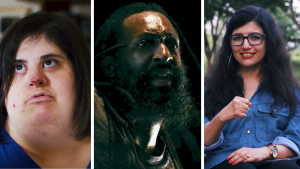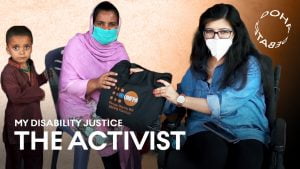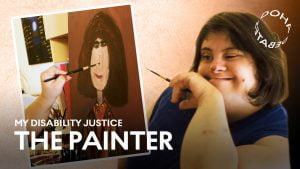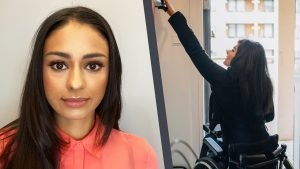Breaking down barriers: How Doha Debates is commemorating International Day of Persons with Disabilities
by Amjad Atallah
A letter from managing director Amjad Atallah
We are all familiar with the saying “You don’t know what you don’t know.” Although we at Doha Debates pride ourselves as a brand of being forward-looking and solutions-focused, it is an ongoing effort to approach our content in a way that reflects all the wonderful diversity humanity has to offer. I am proud that we are commemorating the International Day of Persons with Disabilities this December 3, and that we are committed to educating each other and our audience to learn more about an oft-marginalized community.
The United Nations theme for this year’s awareness day is “Building Back Better: toward a disability-inclusive, accessible and sustainable post COVID-19 world.” Doha Debates will air a special episode of #DearWorldLive and release three new fantastic short films with our partner World Enabled, led by Dr. Victor Santiago Pineda, a social development scholar and disability rights advocate. I first met Dr. Pineda when he was kind enough to speak to our staff about his work. What I didn’t know about the discrimination faced by people with disabilities could fill a library.
Partnering with World Enabled, we are proud to release three new original short films by people with disabilities, celebrating the work of people with disabilities. I dare you not to be inspired by Antoine Hunter’s dancing, or Abia Akram’s work with women with disabilities in Pakistan, or Mia Farah’s artistry and fierce drive. These amazing and beautiful reflections of humanity are all around us, if only we are ready to acknowledge and celebrate their stories. And this is just the beginning of our efforts here to amplify the stories of those with disabilities — through our partnership with World Enabled, we’re also releasing a series of educational modules about how to make our communities and cities accessible to all, which you can view for free at www.cities4all.org.
We all have so much to learn about what we don’t yet know. My first introduction to my own ignorance on this subject was made obvious to me a long time ago: In conversation with a dear friend whose brother had a disability, I laughed at a movie’s caricature of a person with disabilities. I was embarrassed at my insensitivity — but also at my ignorance not initially recognizing why the caricature was offensive.
Over the years, I realized that I had grown up looking at disability as something to be solved, rather than recognizing the discrimination aimed at people with disabilities was the problem we were facing — that I had to change the way I thought, not the other way around. The other lesson was one that I heard Giles Duley, the award-winning photographer and humanitarian, repeat at a recent Education City Speaker Series: “We are often the subject, we are rarely the storyteller.”
Later, I became a fan of and friends with a fantastic Palestinian American comedian and actor, Maysoon Zayid. Maysoon is also a disability rights advocate, and through her work, she has made herself the storyteller rather than the subject — no easy task in Hollywood, and one that will surely pave the way for actors with disabilities who follow her. She speaks truth to power as production companies continue to hire abled actors to play characters with disabilities.
The discrimination faced by people with disabilities, compounded by discrimination they may face by their intersectional identities as people of color or women or members of the LGBTQ+ community diminishes us all. On one of our episodes of #DearWorldLive, Maysoon reminded us that hospitals faced with overwhelming numbers of COVID-19 patients were beginning to institute crisis standards of care plans, something that could mean the difference between life and death for many groups of people, including those with disabilities. Remember that as you watch our films. As with racism, it is not enough to not discriminate against people with disabilities, we must be actively anti-discriminatory.
Our team members and our audience network have also been consistent voices reminding us that there is always more that we could do. Your efforts have made sure that we have made our content more accessible to everyone. I am grateful for the opportunity to have learned so much through this process, but the responsibility was always on me to have learned without requiring people with disabilities to educate me. Nevertheless, I am thankful to every one of my friends and acquaintances who have helped me along the way — and to all of you, for being a part of the Doha Debates family.
I hope you enjoy our special episode of #DearWorldLive and these three life-affirming films. And please let me know what we don’t yet know — that’s how all of us at Doha Debates become better.

Amjad Atallah
Managing Director



